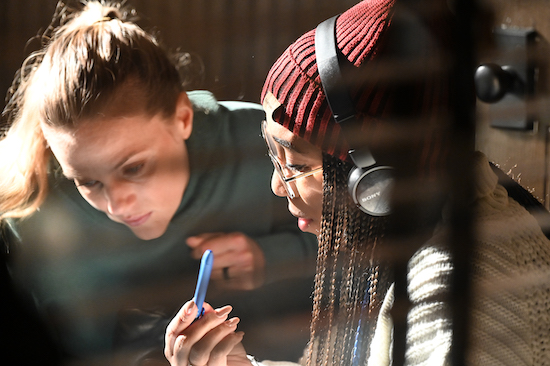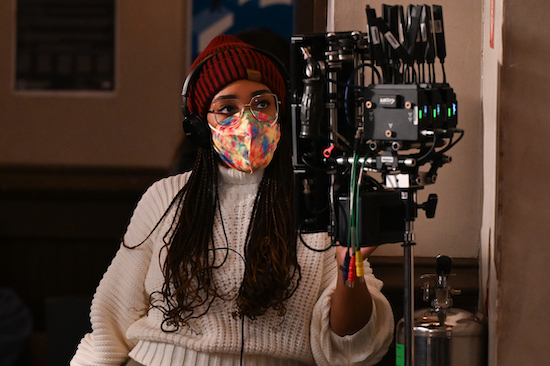CHICAGO P.D. Post-Mortem: Gia-Rayne Harris on Directing the Upstead Twist and the Tension-Filled ‘I Can Let You Go’
January 18, 2023 by Marisa Roffman

CHICAGO P.D. — “I Can Let You Go” Episode 1012 — Pictured: (l-r) — (Photo by: Lori Allen/NBC)
[Warning: This post contains spoilers for the Wednesday, January 18 episode of CHICAGO P.D., “I Can Let You Go.”]
Things went decidedly not well for CHICAGO P.D.’s Upton (Tracy Spiridakos) on the Wednesday, January 18 episode, “I Can Let You Go.”
After Sean (Jefferson White) repeatedly reached out to Upton, she stayed firm in rejecting his calls—until he crossed a line and called Trudy (Amy Morton) at home. Upton went to prison to tell him off, and Sean offered her a deal: He could tell her about the crimes he heard about. Notably, a woman was missing.
Upton and the team jumped on the case, discovering the woman’s young son, and realizing her father, Richard Beck (Lee Tergesen) had been contacted by the kidnappers for ransom. While Richard insisted he and his daughter didn’t know the kidnappers, things got messy, and the woman ended up needing to save herself. But Intelligence was suspicious of the family, not buying the Becks had no clue why they were targeted.
Unfortunately for Upton, the news wasn’t much better for her personal life: After not being able to get in contact with her MIA husband, Halstead (Jesse Lee Soffer), she finally reached Jay’s boss…only to learn that Halstead had extended his tour, by choice, without telling her.
Upton went to visit Sean again, and told him she was done—she was tearing up their deal and she wouldn’t have him in her life anymore.
It was a tension-filled, emotional, yet also action-packed episode…all resting on the shoulders of first-time TV director Gia-Rayne Harris.
Here, Harris breaks down the episode, and its biggest moments/challenges…
Starting at the beginning, working with child actor can be notoriously tough because of their timing limitations, etc., but you got an incredible performance out of him. What was your approach to that?
It was two parts. I was really active in the casting, in his casting. I asked from the beginning if we could have a real casting [session] where we got to meet these kids and understand how they worked. And I just met him and it was just such a done deal. And then when he was on set, it was important to me to meet his mom and to understand not only—I want to know why does he want to act, what’s the secret behind him? What brings out his best self? Because I’m not into manipulation for adults or children. That’s not my version of directing. So I was like, “How do I talk to him to get him into a good place?” And she gave me great tips and told me about his playlist and that kind of thing.
And then he came up to me, because he’s Mr. Confident, and he was like, “The way you’re gonna get me to do this is you got to get mad at me.” [Laughs.] And I said, “Absolutely not.” I said, “Not only will I not get mad at you, but any director in the future that does as a way to get you [to act], you call me and you tell me, because that’s absolutely not okay.”
But I may or may not be able to confirm that I bribed him with candy. Because on his second day, he was just so happy to be there, as was I, and so I wanted to get rid of this adorable smile he has—this dimple he has. And I was like, “You know if you don’t smile at all for the rest [of filming], maybe there’s candy involved.” Maybe that’s the secret to the grounded performance you guys get to watch—candy. I wish it worked on adults.
Lee is someone who has worked within the Dick Wolf world before, but not on CPD. What was it like directing him?
Lee is a wild one. Lee is like a total sweetheart, and he’s somebody who has a totally unique and different way of attacking the work. But he understood the love that [his character] had for his daughter. He understood the love. So it wasn’t very difficult to get him into that. But there might be more to see from him [and that storyline].

CHICAGO P.D. — “I Can Let You Go” Episode 1012 — Pictured: (l-r) — (Photo by: Lori Allen/NBC)
You had a couple of bonkers action sequences. What did you do to prep for those?
It was incredibly fun. I am an action freak. I love action films. And so I was really excited for that section of this.
My first piece [of prep] was to ask questions. [Laughs.] I wanted everybody that’s done this a million times before to tell me how the heck they pulled it off. And I wanted, more than anything, for it to feel authentic. I didn’t want to kind of do this crazy stuff, where you’re like, “How could she possibly have survived?” I needed it to feel like, “Oh, no, that’s totally realistic. And we’re back into the story.” So I asked a lot of questions. And then I was able to play with the cinematographer and say, “Here are the multiple ways I’d love to see this.” And he already had a ton of great ideas, himself, and so we used eight cameras and we pulled it off.
You know, the stunt you see, we got one time. [Laughs.] So it’s a really, really cool thing to have pulled off.
When you know you’ll only have one take, what extra steps are you taking, whether it’s more extensive storyboarding, etc.?
Yes, so I got to work with a storyboard artist, who was fantastic, and that was my first time getting to do that. But I wanted everybody to understand exactly what the goal was. Of course, cars are unpredictable. So we all like, “We’re hoping this happens…”
And it pretty much happened the way it was drawn, because we have a ridiculous stunt team. They are so, so powerful and such a family. I do wish I’d have been a stunt person in my other life, because of them. But there was so much preparation, and so much clarity on exactly how to do this thing safely. So when it happened, we’re like, “Yep, good job, everybody. We pulled it off.”
Sean and Upton have been circling each other for months, but in this case he was literally confined. How did you play with framing and the new tension in their relationship this episode?
The theme for this relationship in this episode for me was Hannibal—like the Hannibal-Clarice relationship. I felt like that kind of cat and mouse game of [him] slowly pulling her in was something I really wanted to play with.
He’s obviously contained, as you said, but he’s still dangerous to her psychology and to her just not being able to walk away from him. So that, and then also, I mean, I’ll just jump to say, the end of the episode and that speech that she gives to him. There’s some subtext there. Who’s that for? So he represents a lot to us now, and I just wanted to play with all of those versions and representations of him.
Tracy had a number of emotional sequences while working by herself—either literally while she was alone or while she was on the phone. How did you two collaborate to make those scenes work?
Tracy is a unicorn. You talk to her about intention, and you clarify and she gives you everything she has. It was my responsibility to protect her space, and get her to that place on her own, just like you saw her alone. She knows exactly what she’s doing and exactly how to access these very real emotions. So my biggest job was just protect that, and to make sure I had the camera in the right place when she was ready. I wish there was a more unique answer, but, honestly, she didn’t need anything other than safety.
Jesse is directing an upcoming episode—did you overlap in your prep work?
No, that would have been great. We did not intermingle.
Since you had watched the whole show, what did filming that Upstead scene, when Upton realized Halstead had made this big decision without her, mean to you?
I had to take the fan hat off, myself, because I was devastated. I’m not gonna lie to you. I have been rooting for that couple forever. And when I read the outline, when I read the script, I was like, “Come on…come on, man!” So I was hurt.
Once I was able to get my director hat back on, though, I was like, “This is important for some level of closure for her.” And so it’s my responsibility to make sure we are looking the right way and giving her the right angle to have this moment. But this is a fun fact: the dialogue, in terms of the other side of the phone call, was never given to her. She didn’t need it, which is a wild thing that she was able to imply what was happening and to be affected in real time when no one was talking to her. What a star.
What were you most proud of in the episode?
It is a really a hard question. I mean to be honest, I’m grateful for every piece. I can’t narrow it down, because I’ve learned something in each thing I got to try, whether it be shooting or action and flipping or just quiet moments with Tracy or the other cast members absolutely being a team, always—I just am grateful.
From a different angle, was there anything unexpected you were proud to pull off?
This is a weird answer, but maybe the montage opening. Like, montages are so hard, as a director, and hard to make them feel like they’re moving the story forward and exactly what are we looking at? But over the head shot above the fan was my very first image that came to my mind when I was reading it. And I’m so grateful that it was able to be there and people are able to see that kind of emptiness in her space. So I think the montage works to illustrate that, but man, it was hard to decide how I could show that in a very, very short amount of time.
Is there anything else you can share about the experience?
I’ll give you a fun fact: The jail scene was actually in jail. So I went to jail for the first and last time in my life. And, oh my, the show was so committed to authenticity that being in that space and feeling those closed walls and feeling those kinds of bars and doors that locked really affected me ,and I think it affected the performances of the people that were there. I’m grateful that the show is so dedicated to that authenticity, because I think that’s why the people love it so much. I hope that you tune in and continue to watch these characters grow.
As a follow-up, on stages, you can remove walls, etc. But in a jail, you’re pretty confined to the space and figuratively handcuffed with your options for shooting. How did you approach it?
Oh, if it felt literally handcuffed at times, because there were these doors that we had to enter at a certain time and a certain buzzer. And it’s such a psychological experience to be like, “I can’t get out. I actually can’t get out.” But it made us have to be more creative in how we showed this world: where we put the cameras, we had a very, very limited schedule for the time that we were there so we couldn’t get it wrong. I was able to scout it. Thankfully. It was terrifying. But everybody that works there is actually so kind and like they gave us so much space. But yeah, I think we just had to get more creative and we had to be committed to what I wanted to try. l couldn’t do the whole, “Maybe over here, maybe over there.” I could not have been more sure of the choices that I made.
–
For more on Harris: Her short film “Pens and Pencils,” which will premiere on HBO’s platform, has been nominated for an NAACP image award. She also has several shorts entering the festival circuit, “Before You,” “Oh Spare Me,” and “Cairn.” (“Before You” is also being developed into a feature film—and is inspired by Harris’ mother, who retired from law enforcement in 2022.)
CHICAGO P.D., Wednesdays, 10/9c, NBC
RELATED:
- CHICAGO P.D.: Gia-Rayne Harris on Sean and Upton’s Showdown, Making Her Network TV Directorial Debut
- CHICAGO P.D.: ‘I Can Let You Go’ Photos
- CHICAGO P.D.: ‘Long Lost’ Photos
- CHICAGO P.D.: Benjamin Levy Aguilar Reflects on the ‘Beautiful’ Experience of Filming Torres’ Big Episode
- CHICAGO FIRE’s Derek Haas and Andrea Newman on Utilizing CHICAGO P.D.’s Amy Morton for Lighter Moments
- CHICAGO P.D.: Gwen Sigan Previews Burgess Seeing Ruzek in ‘a Different Light’
- CHICAGO P.D. Post-Mortem: Gwen Sigan on the Sean Twist and Upton’s Upcoming Emotional Reckoning
- CHICAGO P.D.: ‘Proof of Burden’ Photos
- CHICAGO P.D.: ‘Under the Skin’ Photos
- CHICAGO P.D.: ‘Into The Deep’ Photos
- CHICAGO P.D. Post-Mortem: LaRoyce Hawkins on Drawing on His Real History for the Emotional ‘Sympathetic Reflex’ Ending
- CHICAGO P.D.: ‘Sympathetic Reflex’ Photos
- CHICAGO P.D.’s LaRoyce Hawkins: ‘Every Empathetic Bone’ in Atwater ‘is Going to Be Tested’
- CHICAGO P.D: Jesse Lee Soffer to Direct a Season 10 Episode
- CHICAGO P.D.: Gwen Sigan Teases Diving into the Upton and Burgess Dynamics, Plus Atwater as a ‘Leader’
- CHICAGO P.D.: ‘Pink Cloud’ Photos
- CHICAGO P.D. Post-Mortem: Benjamin Levy Aguilar on Torres ‘Transformation’ Post-‘Donde Vives’
- CHICAGO P.D.: ‘Donde Vives’ Photos
- CHICAGO P.D.: Benjamin Levy Aguilar Previews Torres’ Adjustment to Intelligence and a Close-to-Home Case
- Jesse Lee Soffer and the CHICAGO P.D. Cast Bid Farewell to Jay Halstead
- CHICAGO P.D. Recap: ‘A Good Man’ Says Goodbye
- CHICAGO P.D. Gwen Sigan Previews a ‘Fully Grounded and Authentic’ Exit for Halstead
- CHICAGO P.D.: Gwen Sigan Teases Burzek in a ‘New Place,’ Finding Stability in Season 10
- CHICAGO P.D.: ‘A Good Man’ Photos
- CHICAGO P.D. Post-Mortem: Gwen Sigan and Jason Beghe on the ‘Fractures’ in Intelligence and Voight’s Decision
- CHICAGO P.D.: What You Need to Know About the Season Premiere
- CHICAGO P.D.: Marina Squerciati Teases the Theme for Season 10
- CHICAGO P.D.: Gwen Sigan Teases ‘Tension’ for Voight, Halstead, and Upton in Season 10
- CHICAGO P.D. Season 10 Premiere: ‘Let it Bleed’ Photos
- ONE CHICAGO: NBC Reveals New Posters for CHICAGO MED, CHICAGO FIRE, and CHICAGO P.D.
- CHICAGO P.D.: LaRoyce Hawkins Teases ‘Conflict’ Within Intelligence
- CHICAGO P.D.: Patrick John Flueger and LaRoyce Hawkins on Ruzek’s Big Gesture to Burgess
- CHICAGO P.D.: Gwen Sigan and Jason Beghe Tease the Pressure of the Op Getting to Voight and Anna
- CHICAGO P.D. Recap: Burzek Make a Big Decision About their Future
- CHICAGO P.D.: Marina Squerciati on Burzek’s Uncertain Future
- CHICAGO P.D.: Gwen Sigan Teases a Performing ‘Tour de Force’ in ‘Closer’
- CHICAGO P.D. Post-Mortem: Gwen Sigan Previews Burzek’s ‘Fragile’ Next Steps: ‘Things Will Come to a Head’
- CHICAGO P.D. Post-Mortem: LaRoyce Hawkins on Atwater and Celeste’s Confrontation
- CHICAGO P.D.: LaRoyce Hawkins Previews Atwater’s Connection with an Informant
- CHICAGO P.D.: Tracy Spiridakos and Jesse Lee Soffer on How Upstead’s Relationship with Voight Has Changed
- CHICAGO P.D.: Tracy Spiridakos and Jesse Lee Soffer Break Down Upstead’s Big Decision
- NBC Boss Teases Potential LAW & ORDER and ONE CHICAGO Crossovers
- Daily Dose of Joy: ONE CHICAGO Stars Play Trivia for Charity
Follow @GiveMeMyRemote and @marisaroffman on Twitter for the latest TV news. Connect with other TV fans on GIVE ME MY REMOTE’s official Facebook page.
And be the first to see our exclusive videos by subscribing to our YouTube channel.
As an Amazon Associate we earn from qualifying purchases made through links/ads placed on the site.
Related Posts
Filed under Chicago PD
Comments Off on CHICAGO P.D. Post-Mortem: Gia-Rayne Harris on Directing the Upstead Twist and the Tension-Filled ‘I Can Let You Go’



Comments